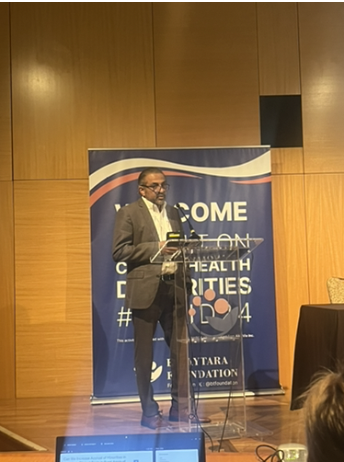Dr. Sharad Ghamande, MD, FACOG delivered an insightful presentation titled “Can We Increase Accrual of Minorities in Rural Areas of the Country? A 12-Year Journey,” shedding light on the imperative need to enhance minority enrollment in clinical trials. Historically, the enrollment of minorities in clinical trials has been minimal. Dr. Ghamande mentioned that the overall proportion of Black patients in pharmaceutical company–sponsored trials stood at 2.9%, while SWOG trials exhibited a significantly higher proportion of 9.0%.
Acknowledging the critical importance of diverse enrollment in clinical trials, Dr. Ghamande underscored that individuals from diverse populations must have access to participate in trials, ultimately leading to improved outcomes for themselves and others. Against this backdrop, Dr. Ghamande outlined key factors that facilitated the Augusta University team’s success in increasing minority enrollment in clinical trials:
- Physician Champion: Having a dedicated physician advocate played a pivotal role in championing the cause of minority enrollment.
- Institutional Resources: Access to institutional resources provided crucial support for conducting outreach and implementing enrollment strategies.
- Support Group: Establishing a support group fostered a sense of community and encouragement among minority participants.
- Outreach into Rural Georgia: Engaging in targeted outreach efforts in rural areas helped reach underserved populations.
- Clinical Trials Selection: Thoughtful selection of clinical trials aligned with the needs and demographics of the target population.
- Community Outreach/Navigators: Collaborating with community outreach programs and navigators facilitated communication and engagement with minority communities.
- Non-Profit Help: Partnering with non-profit organizations offered additional resources and support for recruitment efforts.
- Culturally Congruent Ancillary Navigators: Having ancillary navigators who understood the cultural nuances of the target population enhanced trust and rapport.
- Dedicated Staff: Employing dedicated staff members focused on minority recruitment ensured consistent and effective outreach efforts.
- Buddy System: Implementing a buddy system provided peer support and guidance throughout the trial participation journey.
In summary, Dr. Ghamande’s presentation emphasized the critical need to address disparities in minority enrollment in clinical trials and highlighted successful strategies employed by the Augusta University team to increase participation among minority populations in rural areas. Through collaborative efforts and targeted initiatives, it is possible to pave the way for more inclusive and equitable access to clinical trials, ultimately leading to improved healthcare outcomes for all.





